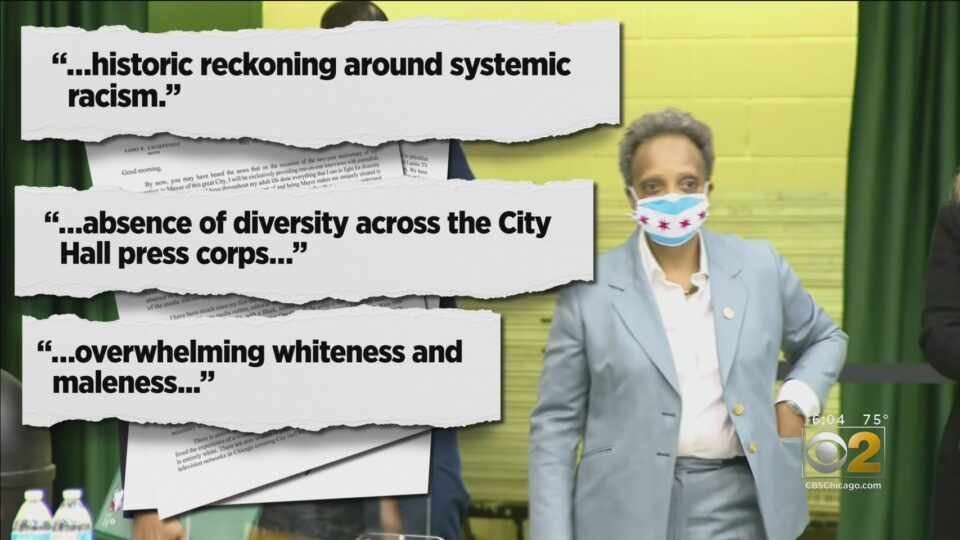Chicago Mayor Backed by Her City’s Black Press
Gunshots Interrupt the Live Shot
New Tribune Co. Owner Already Offering Buyouts
Trustees to Consider Tenure for Hannah-Jones
Who’ll Be the Next Diversity Advocate Targeted?
AP Managers Admit Fault in Staffer’s Firing
Arab American Reporters Said to Be Frustrated
‘Tips’ for Covering Palestinian Perspective
A Measuring Tool for Diversity Effectiveness
In Latino San Antonio, Just 25% of Anchors Are
Internal Fight at Black Press Group Escalates
Passings:
David T. Foster III
Edward McDonald
John ‘Rucks’ Russell
Short Takes: Karine Jean-Pierre; Juan Williams; A Martínez; Marcia Pledger; upcoming Nieman Fellows and more.
Support Journal-ismsMayor Lori Lightfoot tells Tahman Bradley of WGN that for that one day, “It’s important to me that diversity is put front and center.” (Credit: WGN)
Chicago Mayor Backed by Her City’s Black Press
Chicago Mayor Lori Lightfoot’s decision that for one day she would grant one-on-one interviews only to people of color put members of Chicago’s Black press at odds with the prevailing media narrative.
Some, such as the National Association of Black Journalists, have said that Lightfoot’s message on the lack of media diversity was valid but that she addressed her concern the wrong way.
The Black press members argue that Lightfoot, marking her second anniversary on the job, had it right. “Black Media’s vantage point is often different than mainstream,” they wrote last week. “Our niches represent authentic voices of diverse Black audiences, who are often seen with a stereotypical lens. Too often, White coverage focuses on violence, deprivation, and negative behavior which represents a small percentage of Chicago’s Black community yet dominates news coverage.
“We recognize that Black politicians are held to a different standard. We have witnessed White media’s relentless scrutiny of past Black politicians like Harold Washington, Eugene Sawyer, Todd Stroger, and more recently, of States Attorney Kim Foxx. Some of the attacks have been unmerciful, unfair, and yes — even racist. Mayor Lightfoot recognizes a new day should have a new way.
“We applaud Mayor Lightfoot, Chicago’s first Black female gay mayor, for standing up to the status quo and recognizing that granting Black media with exclusive interviews is customary in the profession of media coverage.”
The declaration was published May 20 in the Chicago Defender and signed by those who would benefit most from the mayor’s action.
They are: Tracey Bell, The IBM Company — 95.1FM; Melody Spann Cooper, Midway Broadcasting Corporation — WVON and WRLL Radio; Janice & Durell Garth, Citizen Newspaper Group; Hermene Hartman, Hartman Publishing/N’DIGO; Rael Jackson, Current [South Shore Current]; Dorothy Leavell, The Chicago Crusader.
Also, Dyanna Knight Lewis, Real Times Media — The Chicago Defender; Yvette Moyo — South Shore -Current; Jamil Muhammad — C.R.O.E; Munson Steed — Rolling Out [Steed Media-Rolling Out]; Carl West — TBT News.
As reported last Wednesday, Lightfoot declared, “I have been struck since my first day on the campaign trail back in 2018 by the overwhelming whiteness and maleness of Chicago media outlets, editorial boards, the political press corps, and yes, the City Hall press corps specifically.”
Lightfoot isn’t the only politician to have made such an observation.
During the 2020 Democratic presidential primary campaign, now-Vice President Kamala Harris, speaking with about 20 of her Senate colleagues, told a panel of Black journalists at the Capitol that her presidential candidacy was hampered by the dearth of Black reporters covering the campaign.
“I wish more Blacks were covering me,” Harris said, according to news reports of the March 11, 2020, meeting.
“I can’t stress the importance of Black journalists and Black journalism,” Harris continued.
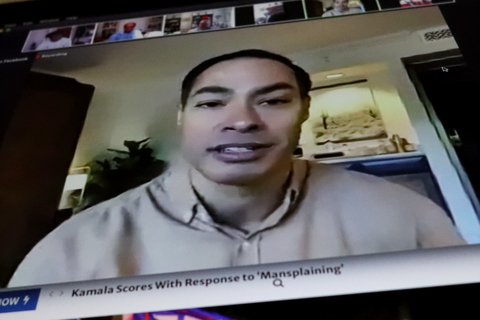 After the election, Julian Castro (pictured), the only Hispanic Democratic presidential candidate last year, told the Journal-isms Roundtable in October, “I could see in my own campaign on the trail that journalists of color often got the nuance.” They covered the campaign “much more solidly and were willing to put that [nuance] in the stories more.
After the election, Julian Castro (pictured), the only Hispanic Democratic presidential candidate last year, told the Journal-isms Roundtable in October, “I could see in my own campaign on the trail that journalists of color often got the nuance.” They covered the campaign “much more solidly and were willing to put that [nuance] in the stories more.
“We know that in newsrooms around the country, from the most prestigious papers to local newspapers, that are covering important community issues, the mainstream media have done a terrible job, just like Hollywood and much of corporate America, especially Silicon Valley, with diversity.”
Since the campaign, owing in part to the racial reckoning galvanized by the police murder of George Floyd, some news organizations have added journalists of color to their political coverage and commentary. But as Castro said, issues of nuance and context are often still at issue, as reaction to Lightfoot’s declaration demonstrates.
In an otherwise balanced editorial, the Chicago Sun-Times wrote last week, “By publicly coupling her edict with her frustrations with the media as a Black woman mayor, Lightfoot risks reinforcing the long-held and false notion that Black and Brown journalists are people of color first and reporters second — biased in favor of sources that look like they do.”
Why go there? Repeating false notions has a name in journalism ethics circles: “the liar’s dividend.” The Berkman Klein Center for Internet & Society put it this way: “Make the truth, not the falsehood, the most vivid take-away.”
Others have responded with high-minded statements. The National Association of Hispanic Journalists said, “NAHJ does not condone restricting press access based on a journalist’s race/ethnicity. Any action that threatens the cornerstone of our democracy and First Amendment rights is unacceptable.”
Chicago Tribune City Hall reporter Gregory Pratt, who is Latino, tweeted, “Politicians don’t get to choose who covers them.”
But as Clarence Page countered last week in the Tribune, “Except, of course, major officeholders do routinely choose which requests to accept or reject for one-on-one interviews. The burning issue in essence here is whether they should be chosen based on the color of their skin.
“For too long, the wrong skin color or gender meant you were more likely to be rejected. For media workers and the audiences we serve, that had dire consequences.”
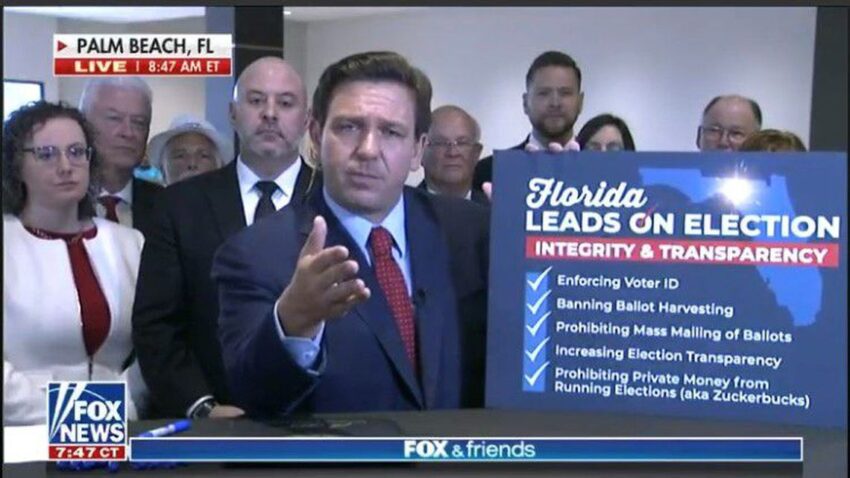
In addition, as Susy Schultz, executive director of Chicago’s Museum of Broadcast Communications, pointed out Wednesday night, women seem to have forgotten that their numbers increased in the 1930s when first lady Eleanor Roosevelt “insisted that only women cover her news conferences,” as Kay Mills reports in her “A Place in the News: From the Women’s Pages to the Front Page.”
Political persuasion might also have something to do with that access.
Just this month, Florida Gov. Ron DeSantis signed a new voter restriction law. “Only Fox News, the Republican version of state-run media, was allowed in as Florida became the latest state to join the growing trend of imposing new barriers to voting,” the SunSentinel in South Florida reported.
Sunday talk-show bookers routinely grouse about who does and does not accept invitations to appear. There’s no debating that politicians have their favorite reporters and television interviewers.
Journalists are correct to question whether Lightfoot had motives other than fostering media diversity. Is the mayor trying to divert attention from other pressing issues or from her shortcomings?
Yet it’s troubling to hear some compare giving a break to Black and brown reporters with “anti-white racism.”
That’s the basis on which former Hawaii congresswoman and Democratic presidential candidate Tulsi Gabbard called for Lightfoot’s resignation. She tweeted, “Mayor Lightfoot’s blatant anti-white racism is abhorrent. I call upon President Biden, Kamala Harris, and other leaders of our country — of all races — to join me in calling for Mayor Lightfoot’s resignation. Our leaders must condemn all racism, including anti-white.”
Not surprisingly, the biggest and earliest headlines about Lightfoot’s move came from right-wing media invested in fanning white grievance.
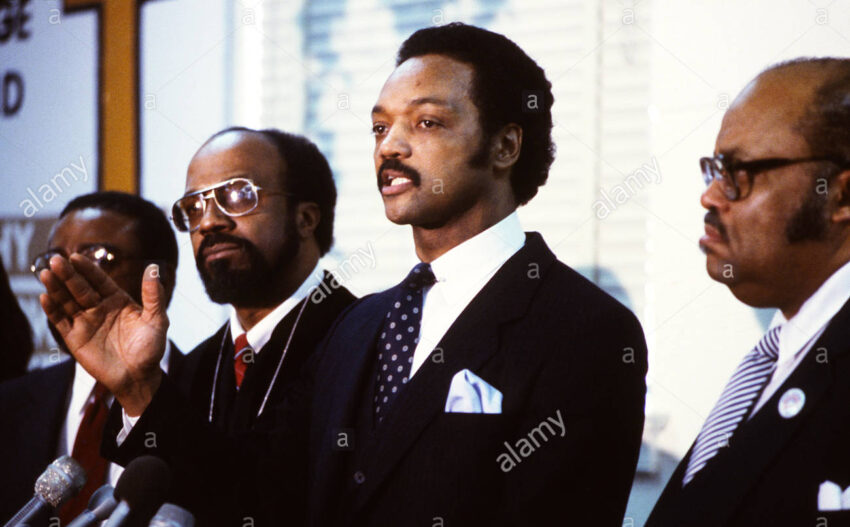
Lurma Rackley, a former journalist who was press secretary to the late D.C. Mayor Marion Barry Jr., said she sees similarities with the arguments against affirmative action.
Rackley came up in journalism in the early 1970s, when Black politicians would hold background sessions with Black journalists, knowing that these reporters weren’t on the golf courses or other venues where white male politicians were confiding in their media counterparts. True, one difference was that the Black politicians then weren’t in the media glare the way that Lightfoot is.
Still, Rackley pointed out, when organizations without any Black representation came to Mayor Barry to do business, Barry told them to come back when they had some.
“If you force the issue, that will change” things, Rackley said by telephone. She said Barry and others of his era would be pleased by Lightfoot’s stand.
Similarly, Sam Fulwood III, now dean of the School of Communication at American University, recalls that Jesse Jackson, running in 1984 as a Democratic candidate for president, insisted that Black journalists be on his campaign plane. Fulwood was one of those journalists.
Fulwood wrote in 2008 for The Root, “Jesse Jackson’s 1984 presidential campaign boosted — no, it actually created — the careers of a whole cadre of black political reporters,” listing some of them, including Kevin Merida, now the incoming executive editor of the Los Angeles Times.
Jackson boasted at that year’s NABJ convention, “As a result of our campaign, African Americans can now write about a presidential race. You can now comment on national TV talk shows.”
He also said, “In many ways, African American journalists are at the back of the journalistic bus. And some of the same techniques and tactics that got us [off] the back of the public accommodations bus, and the back of the political bus, must be employed to get us [out] the back of the journalistic bus.”
Yet those Black and brown journalists are in a profession where they are expected to hold news sources like Jackson and Lightfoot accountable.
NABJ, founded in 1975, came together in an era when many Black journalists owed their jobs to pressure from members of the Black community. The Black press, with its tradition of advocacy, has no problem working with Black politicians. Media industry groups freely lobby on Capitol Hill and in statehouses among the newsmakers their constituents cover. Sanctimony by itself doesn’t always get results.
Two years ago, the Congressional Black Caucus joined NABJ in calling for more diversity in executive news leadership at CNN.
And 10 years ago, NABJ was ready to reach out to politicians in an effort to reverse diversity setbacks. “NABJ’s mission is to connect with the Black community,” then-president Gregory H. Lee Jr. said. “The community involves pastors, school teachers, lawyers and yes even politicians,” Lee told Journal-isms at the time.
- Don Babwin and Sophia Tareen, Associated Press: Chicago mayor: Reporters of color get 2-year mark interviews (May 19)
- Nicole Chavez and Kerry Flynn, CNN: Chicago mayor is only granting interviews to journalists of color for her two-year anniversary
- Chicago Tribune: Letters: Readers sound off on Mayor Lightfoot’s interview policy
- Stephen A. Crockett Jr., The Root: Why White People Are Whining About Lori Lightfoot, Explained
- John W. Fountain, Chicago Sun-Times: Dear Mayor Lightfoot, thank you for acknowledging the elephant in the room
- Dahleen Glanton, Chicago Tribune: Mayor Lori Lightfoot is correct: Newsrooms need more diversity
- Mary Mitchell, Chicago Sun-Times: Mayor Lightfoot calls out media for glaring lack of diversity
- Allison Morrow, CNN: Latino journalist explains why he turned down interview with Chicago’s mayor
- Ezinne Ukoha, Medium.com: Why Mayor Lori Lightfoot Is Shaking Up White Media
- Craig Wall, WLS-TV, Chicago: Mayor Lightfoot only granting interviews to reporters of color ahead of 2nd anniversary (May 19)
- Alice Yin, Chicago Tribune: Mayor Lori Lightfoot chooses only reporters of color for interviews ahead of 2-year-anniversary, sparking debate over media diversity and access
Gunfire during the @ABC crew’s liveshot from George Floyd Square. Hope you are safe @Alex_Presha. This is unbelievably heartbreaking. pic.twitter.com/1QfsNqIv4A
— Nikki Muehlhausen (@NikkiKARE11) May 25, 2021
Gunshots Interrupt the Live Shot
“ABC News reporter Alex Presha was reporting live from George Floyd Square in Minneapolis — where people have been observing the first anniversary of Floyd’s death — when gunfire could be heard,” Mark Joyella reported Tuesday for Forbes.
“ ‘Our team heard what sounded like well over a dozen gunshots,’ Presha said later on Twitter. ‘We’ve rushed behind a row of cars.’
“The gunfire — audible on air — turned a routine live report into a moment of tension and uncertainty. Presha was off camera as file video aired, but after the sound of the gunfire, he could be heard saying ‘hang on’ and then a voice saying ‘down, down, down’ and ‘behind the engine block’ urgently. . . . .”
Joyella also wrote, “Presha, on Twitter, later said ‘we’re OK. Definitely sad way to start a day that’s so important to so many people.’ . . .”
- Hibah Ansari, Andrew Hazzard, Becky Z. Dernbach and Joey Peters, Sahan Journal, Minneapolis: ‘We’re evidence that the healing is happening’: How five people in Minneapolis experienced the cataclysm of George Floyd’s killing — and what they did next.
- Angela Davis and Maja Beckstrom, Minnesota Public Radio: Continuing the conversation: How George Floyd changed us
- Editorial, Los Angeles Times: Was George Floyd’s death in vain?
- Editorial, Star Tribune, Minneapolis: One year later: The renewed push for equality in America
- Robin Givhan, Washington Post: The Floyds are marking time
- Dana Milbank, Washington Post: Rarely has the GOP fixation on race shown all its ugly facets like this
- Jon Jeter, Minnesota Spokesman Recorder: George Floyd did — and — did not change the world
- Jason Johnson, The Grio: Don’t let the anniversary of George Floyd’s murder be an excuse to ignore history
- Erin Aubry Kaplan, Mitch Landrieu, Keisha N. Blain, Kyle Shelton, Monica C. Bell, Jeffrey Sonnenfeld and Kirsten Greenidge, Politico Magazine: What George Floyd Changed
- Andy Mannix, Star Tribune, Minneapolis: Los Angeles Times reporters assaulted by Minnesota State Patrol during unrest, lawsuit says
- Minnesota Spokesman Recorder: ‘I knew his life mattered’: Darnella Frazier honors the one-year anniversary of George Floyd’s death
- MPR News Staff: Photos: George Floyd and the year of racial reckoning
- National Association of Black Journalists: George Floyd: One Year Later: NABJ & Its Black Male Media Project Reflect on the Impact of Floyd’s Death, How It Changed America and the Journalism World
- Anonne Netties, Zora/Medium: George Floyd’ One Year Later: ‘Racial Battle Fatigue’ and 365 Days of Trauma
- Ernest Owens, The Grio: Five ways George Floyd really changed the world
- Will Sutton, NOLA.com: George Floyd brought us a worldwide movement. He’ll bring us less pain, more justice. In time.
- Cathy Wurzer, Laura Yuen, Brandt Williams and Evan Frost, Minnesota Public Radio: Capturing History: News journalists look back One year covering the George Floyd story
New Tribune Co. Owner Already Offering Buyouts
 “Two days after hedge fund Alden Global Capital completed its $633 million acquisition of Tribune Publishing, the new owners of the Chicago-based newspaper chain are offering newsroom employees a buyout,” Robert Channick reported Wednesday for the Chicago Tribune.
“Two days after hedge fund Alden Global Capital completed its $633 million acquisition of Tribune Publishing, the new owners of the Chicago-based newspaper chain are offering newsroom employees a buyout,” Robert Channick reported Wednesday for the Chicago Tribune.
“The voluntary separation plan was sent Wednesday to nonunion newsroom employees at the Chicago Tribune and other Tribune Publishing newspapers. The offer includes 12 weeks of pay for eligible employees with three or more years of continuous service, plus an additional week of pay for every year with the company. Eligible employees with less than three years of service would receive eight weeks of pay under the plan.”
Channick also wrote, “In addition to the Chicago Tribune, Tribune Publishing owns The Baltimore Sun; the Hartford Courant; the Orlando (Florida) Sentinel; the South Florida Sun Sentinel; the New York Daily News; the Capital Gazette in Annapolis, Maryland; The Morning Call in Allentown, Pennsylvania; the Daily Press in Newport News, Virginia; and The Virginian-Pilot in Norfolk, Virginia.”
Channick described Alden Global Capital as a “New York-based hedge fund with a reputation as one of the industry’s most aggressive cost-cutters,” and added, “Last year, Tribune Publishing employment fell by 30%, dropping from 4,114 employees at the end of 2019 to 2,865 employees at the end of 2020, according to the company’s annual reports. The company had a total of 896 newsroom employees across its eight markets entering this year. . . .”
Trustees to Consider Tenure for Hannah-Jones
 “Tenure for Nikole Hannah-Jones (pictured) at UNC-Chapel Hill is officially back up for consideration and in the hands of the university’s Board of Trustees,” Kate Murphy reported Wednesday for the News & Observer in Raleigh, N.C.
“Tenure for Nikole Hannah-Jones (pictured) at UNC-Chapel Hill is officially back up for consideration and in the hands of the university’s Board of Trustees,” Kate Murphy reported Wednesday for the News & Observer in Raleigh, N.C.
“Trustee Chuck Duckett told The News & Observer he received the re-submission from the university’s Appointments, Personnel and Tenure Committee, which is made up of tenured professors, on Tuesday.
“This doesn’t guarantee that there will be a vote, and it’s unclear when the board may take up the issue. The next official board meeting isn’t scheduled until July 14 and 15, after Hannah-Jones is set to start her job as the Knight Chair for Race and Investigative Journalism at UNC-CH. . . .”
. . . Who’ll Be the Next Diversity Advocate Targeted?
“UNC-Chapel Hill has sullied its reputation again, this time by giving into white conservative fears about a powerful black woman,” Issac Bailey (pictured), editorial writer for the Charlotte Observer, wrote May 20, updated Friday
 “And make no mistake, the decision to deny tenure at the Hussman School of Journalism and Media to Nikole Hannah-Jones (pictured), one of the most influential, decorated and important journalists of our era, was in large part about race. About her race. About her ability to speak truthfully and unapologetically about racial issues that have been with us since before our founding. About her unflinching dedication to raising the bar on what this country should expect of itself – what Americans should expect of each other – on subjects many would rather deny or tiptoe around. . . .”
“And make no mistake, the decision to deny tenure at the Hussman School of Journalism and Media to Nikole Hannah-Jones (pictured), one of the most influential, decorated and important journalists of our era, was in large part about race. About her race. About her ability to speak truthfully and unapologetically about racial issues that have been with us since before our founding. About her unflinching dedication to raising the bar on what this country should expect of itself – what Americans should expect of each other – on subjects many would rather deny or tiptoe around. . . .”
Bailey (pictured) also wrote, “This isn’t just about this one hire. It’s bigger than that. It’s the latest sign that everyone serious about issues of diversity, inclusion and equality best steel their spines. . . .
“This week, a group of white conservative graduates of Davidson College, where I teach and also graduated, sent out an email blast. . . . In it, they decried recent moves by the college to allow more religious diversity on the school’s board of trustees and in the president’s office as political correctness run [amok]. The signees of the letter included James G. Martin, a former governor of North Carolina, as well as Greg Murphy, a Republican member of Congress who claimed Kamala Harris’s success was largely the result of her race and gender. . . .”
-
Lauren McCarthy, Daily Tar Heel: Nikole Hannah-Jones considering legal action against UNC after tenure non-action
- Katie Robertson, New York Times: Nikole Hannah-Jones Receives Support in Tenure Dispute
- Emily Shih, Daily Tar Heel: ‘A disappointing decision’: UNC community upset after Nikole Hannah-Jones’ non-tenure
AP Managers Admit Fault in Staffer’s Firing
 “Senior managers at the Associated Press admitted fault on Wednesday in the firing last week of a 22-year-old junior staffer, Emily Wilder, (pictured) who was being targeted by right-wing commentators over her political activism in college,” Jeremy Barr reported Wednesday for The Washington Post.
“Senior managers at the Associated Press admitted fault on Wednesday in the firing last week of a 22-year-old junior staffer, Emily Wilder, (pictured) who was being targeted by right-wing commentators over her political activism in college,” Jeremy Barr reported Wednesday for The Washington Post.“Wilder was fired last Wednesday for violating the news organization’s social media policy. Company managers felt that her tweets showed a bias toward the Palestinian people in their conflict with the Israeli government and Israeli settlers — though Wilder says her editors never told her which of her tweets were problematic.
“Since then, the AP — a huge international news organization whose internal dramas rarely go public — has been dealing with dissent from employees who feel it abandoned Wilder in the face of an online mob. On Monday, more than 100 AP staffers signed an open letter expressing frustration with how the company handled the termination and demanding ‘more clarity’ about why Wilder was fired.
“The Associated Press has not apologized or acknowledged mistakes in its public statements, beyond saying in response to the open letter that the company ‘looks forward to continuing the conversation with staff about AP’s social media policy.’
“But managers took a much more apologetic tack in a town hall with employees on Wednesday, an audio recording of which was shared with The Washington Post. . . .”

Samar Abu Elouf says that the difficulties covering the Israeli bombardment of Gaza make her more determined to work on the story. (Courtesy Samar Abu Elouf via Al Jazeera) Arab American Reporters Said to Be Frustrated
.. . . Meanwhile, some Arab American reporters in the United States are detecting a pro-Israeli bias among news editors, according to Aymann Ismail, writing Saturday for Slate. The reporters were not willing to be named, fearing reprisals, Ismail wrote.
“Omar was an Arab American reporter on the ground in 2014 for a major American newspaper. (Omar is not his real name.) When he tried to cover the mass Palestinian causalities, he began to get what he saw as perplexing orders from his editor’s bosses.
“ ‘They wanted us to do journalism in the service of IDF talking points,’ he said, referring to the Israel Defense Forces. ‘They were very keen on us doing stories where we can find rocket batteries that Hamas was using to fire rockets into southern Israel, and they wanted us to map out the proximity to schools and UNRWA [United Nations Relief and Works Agency] sites that were housing people that were internally displaced.’ Omar said his immediate editors tried to focus on reporting what he was seeing on the ground, but they faced resistance.”
Ismail also wrote, “This experience was a familiar one to many journalists who started talking with one another on private WhatsApp chat groups and Slack channels as the latest violence broke out in Gaza and Israel. The chats are made up of dozens of journalists across a range of media organizations who are sharing stories of seeing their work doubted and altered. They’re sharing tips on how to have difficult conversations with editors who are reluctant to publish articles that focus on Palestinian voices. And they’re also talking about some positive shifts they are seeing in the coverage.
“But even with those shifts, almost no one I spoke to would allow their name to be used, a sign that the fear of reprisal remains strong.
“Layla, a former New York Times journalist who also asked that her real name not be used, has a theory about what’s changed. ‘The collective political consciousness has shifted largely because of Black Lives Matter,’ she told me. ‘Last summer, our newsrooms as a reflection of a larger society had to take a hard look at state violence, how we perceive it, how we cover it, in a way we haven’t done before.’
“Layla, who is Palestinian American, shocked even herself when she eventually quit the Times. . . .“
‘Tips’ for Covering Palestinian Perspective
The International Center for Journalists Monday republished guidelines from a group calling itself the Arab and Middle Eastern Journalists Association, “Tips and resources for covering issues related to Israel and Palestine.”
Among them:
 “Interview Palestinians. Your story is always incomplete without them. Former U.S. diplomats, Israeli military analysts and non-Palestinian Middle East commentators are not replacements for Palestinian voices.
“Interview Palestinians. Your story is always incomplete without them. Former U.S. diplomats, Israeli military analysts and non-Palestinian Middle East commentators are not replacements for Palestinian voices.“Be cognizant of how you’re identifying Palestinians. Do not use the identifiers ‘Arab-Israeli’ or ‘Israeli-Arab,’ unless requested by the individuals described. Instead use ‘Palestinian citizen of Israel’ if that applies, or ‘Palestinian.’ Also recognize Palestinians represent multiple faith backgrounds, including Muslim, Christian, Jewish, Samaritan, Baha’i and others. Ignoring this diversity perpetuates the misleading notion that the conflict is a religious one between Jews and Muslims rather than political in nature.
“Check in on your staffers of Arab and Middle Eastern descent, especially those who may be personally impacted by the situation. Be receptive to their feedback on your news organization’s coverage of the conflict without placing undue burdens on them. Recognize that their knowledge of the region and cultural fluency can be an asset to your organization’s coverage. . . .”
- Doug George-Kanentiio, indianz.com: Palestinians are Natives
- Maram Humaid, Al Jazeera: ‘This time is different’: Gaza journalists on Israeli bombardment
- Kelly McBride, NPR: Charges of bias and inaccuracies in the reporting on the Israeli-Palestinian conflict continue to dominate our inbox.
- Steven Scheer, Reuters: Israeli media urges Facebook, Twitter to act on incitement against reporters
- Brian Stelter, CNN: Associated Press employees want answers after reporter’s firing
- Erik Wemple, Washington Post: How the AP wronged Emily Wilder
- Janine Zacharia, Politico Magazine: The Real Problem With the AP’s Firing of Emily Wilder
A Measuring Tool for Diversity Effectiveness
“When it comes to communities of color, the challenge is often not about rebuilding trust, but about building a relationship from scratch,” Joy Mayer wrote Monday for Trusting News.
“When community members feel the news has not been made by or for people like them, there isn’t a connection or loyalty to build on. Worse, some communities have been legitimately harmed by news coverage that has misrepresented or exploited them. . . .
“A new piece in the Columbia Journalism Review from Letrell Deshan Crittenden of Thomas Jefferson University offers a concrete, useful starting point for this work. Crittenden has spent two years developing a rubric for newsrooms that can help assess newsroom staff, processes, coverage and trust. . . .”
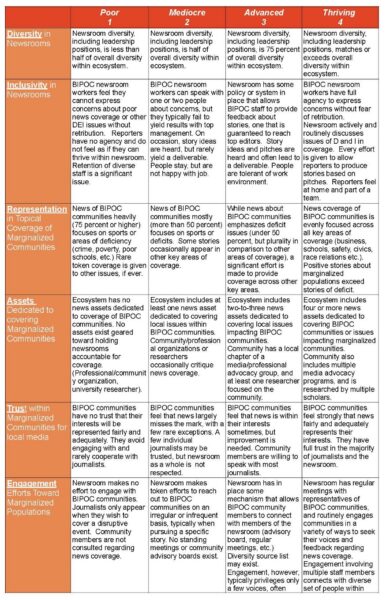
Letrell Deshan Crittenden’s piece in Columbia Journalism Review was headlined, “Why we need a rubric for assessing local news coverage of traditionally marginalized communities.”In Latino San Antonio, Just 25% of Anchors Are
“A troubling report by the San Antonio Association of Hispanic Journalists finds that only 25 percent of anchors in the Alamo City are Latino,” Candice Avila-Garcia reported Tuesday for mysantonio.com.
 “For perspective, San Antonio’s population is 65 percent Latino, according to the U.S. Census.”
“For perspective, San Antonio’s population is 65 percent Latino, according to the U.S. Census.”Newspapers and broadcast outlets reach a wider area than the city with which they are identified, but Bexar County, which includes San Antonio, is still 58.7 percent Hispanic or Latino, according to the 2010 Census.
” ‘Anchors are the “faces” of the station. They are heavily promoted on commercials, billboards and ad campaigns,’ the report states. ‘Anchors also have the agency — and responsibility — to frame news narratives fairly and fact check powerful people in real time during political interviews or unfolding breaking news. Without Latino anchors, inaccuracies about the Latino community are more likely to be given play on air.
“The audit, released Monday, examines local English language television stations, not including KLRN or Spectrum News. The report looks at 55 anchors in San Antonio who cover news, weather, traffic, sports and live desk coverage. . . .”
The subscription-only NewsBlues website added Thursday, “A day later, KENS 5 general manager Tom Cury responded to the organizaton’s call for action.
“ ‘We acknowledge the importance of representation and we know there is more work to be done. We welcome a discussion with SAAHJ on this topic. We’d also like to better understand their methodology, as their data differs from ours,’ said KENS 5 President and General Manager Tom Cury. ‘We believe it is also important to look at representation across entire content teams, including decision-makers like producers and news directors, in addition to stories that reflect the diversity of the San Antonio community – both of which we believe are equal to, if not greater than, representation in on-air talent.
” ‘We’ve been in touch with SAAHJ and look forward to continuing this conversation.’ . . . KENS was the first and only station to reach out so far. The report addressed talent on KSAT, KABB and WOAI as well.”
Nora Lopez, metro editor of the Express-News, is also president of the National Association of Hispanic Journalists. NAHJ issued a statement that it “stands with the San Antonio Association of Hispanic Journalists (SAAHJ) in calling on San Antonio TV news managers to create more inclusive anchor teams that reflect the majority-Latino demographics of San Antonio.”
- Sarah Bartlett and Julie Sandorf, New York Times: How New York City Is Saving Its Local News Outlets
- Borealis Philanthropy: Racial Equity in Journalism Fund Awards $3.6 Million to News Organizations Led By and Serving Communities of Color
- Clio Chang, Nieman Reports: Serving the Audiences Mainstream Newsrooms Don’t (May 19)
- David Cohen, Adweek: Pinterest Touts Progress in Its 2020 Inclusion and Diversity Report
- Mike Farrell, nexttv.com: Comcast Updates Progress on Diversity, Equity & Inclusion Efforts
- Nicole Froio, Current: How journalists are challenging ideas of objectivity while empowering their communities (May 20)
- NPR: Diverse Sources Database — Find experts from racial and ethnic groups underrepresented in the media.
- Krystal Nurse, Lansing (Mich.) State Journal: Journalism’s diversity work must start outside the newsroom
- TVNewsCheck: Nielsen, Boston Globe To Conduct Cross-Platform Diversity & Inclusion Brand Study (May 19)
Internal Fight at Black Press Group Escalates
In 2019, the trade organization representing the Black newspaper press was taken to court by its former chair, Dorothy R. Leavell of the Chicago and Gary (Ind.) Crusader, who asserted that the organization’s president, Benjamin F. Chavis Jr., and his allies worked behind the scenes to disqualify pro-Leavell publishers from voting for her re-election bid. She lost the election.
This week, the secretary of the National Newspaper Publishers Association, Jackie Hampton, publisher of the Mississippi Link, notified Leavell, Amelia Ashley-Ward of the Sun Reporter in San Francisco and the California Voice, and Carole Geary of the Milwaukee Courier that the board intends to consider expelling them from NNPA at its June 23 meeting. The letter cited alleged offenses that it says “have threatened the welfare of the NNPA.”
Responding to an inquiry from Journal-isms, Leavell, Ashley-Ward and Geary collectively said in part that, “This threatened expulsion is in retaliation for our case filed in 2019. . . . All three of us represent almost 150 years of membership of our newspapers, and more than 100 years combined personally.” Leavell added later, ” “There are serious charges in our lawsuit. So far the judge has upheld the suit to proceed and not dismissed it as the defendants would hope.”
The joint statement also said, “We three publishers are committed to cleaning up the Black Press of America, represented by the National Newspaper Publishers Association, under Dr. Chavis’ leadership. Funds expended so far in this case has been the personal funds of the Plaintiffs (Leavell, Ward and Geary). ‘We wish to plead our own cause . . .’ just as John B. Russwurm and Samuel E. Cornish said in the first issue of Freedom’s Journal on March 16, 1827.”
Passings
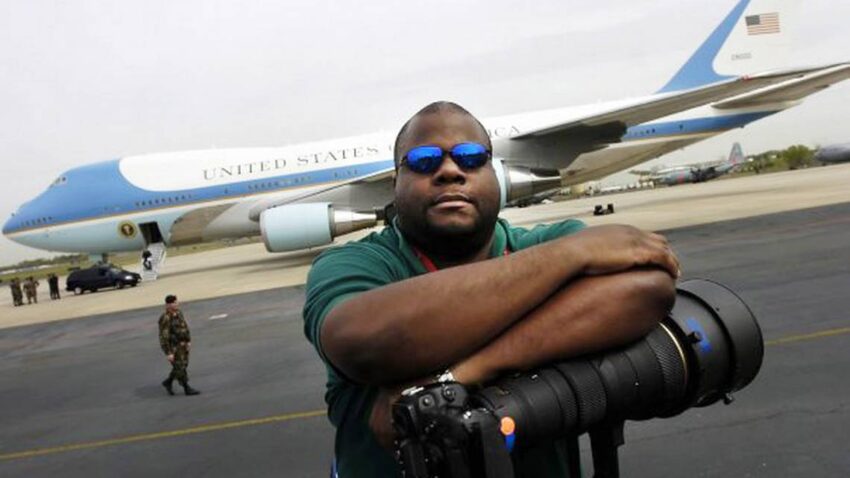
David T. Foster III “was almost always initially reserved. But if the situation was intimate enough, Foster could be relied on at some point to lower his camera and jovially regale the people he was shooting with a colorful story or personal reminiscence,” Theoden Janes wrote. “And when the work was done, he’d talk your ear off before, during and after unloading the endless amounts of gear back into his car.” (Credit: Charlotte Observer)David T. Foster III
David T. Foster III, “a cigar-chomping, UNC Tar Heel-loving bear of a man who was an award-winning staff photographer and videographer” for the Charlotte Observer for the better part of three decades — was found dead in his apartment off . . . Park Road in Charlotte on Monday afternoon,” Theoden Janes reported Wednesday for the Observer. “He was 52. Charlotte police said there is no indication that foul play was involved in Foster’s death.”
Edward McDonald
 In Macon, Ga., “13WMAZ has lost another member of its broadcast family,” Raymond Tubb reported for the station on May 17, updated May 19. “Former sports anchor, Edward McDonald (pictured), died from a heart attack at his Ellenwood home Sunday.
In Macon, Ga., “13WMAZ has lost another member of its broadcast family,” Raymond Tubb reported for the station on May 17, updated May 19. “Former sports anchor, Edward McDonald (pictured), died from a heart attack at his Ellenwood home Sunday.“In recent years he’d undergone a kidney transplant and dealt with lupus. His wife told 13WMAZ that he’d been doing well lately, and that his death came as quite a shock. . . .”
“McDonald’s bright smile and big personality were a fun part of our broadcasts for around half a decade through the late 1990s.
“He covered everything from UGA’s trip to the Outback Bowl to the Macon Braves, but most of all he loved showcasing the local talent in the local high schools. Back at the station, he was affectionately known as ‘E-Mac.’ “
(Credit: KHOU-TV)
John ‘Rucks’ Russell
“John ‘Rucks’ Russell, a former KHOU-11 reporter and government aide, died Wednesday after contracting COVID-19,” Jasper Scherer reported May 13, updated May 14, for the Houston Chronicle.
“He was 55. Russell came down with the virus while caring for his twin brother, Edgar, who also died after contracting COVID, according to Doug Miller, Russell’s former KHOU-11 colleague. Russell had been weakened by a previous bout with cancer, which medical experts say placed him at a higher risk of developing severe symptoms from the virus, even in remission.”
Prior to KHOU, Russell worked for WNCN Raleigh, WRIC Central Virginia as well as stops in Washington, Orlando and Roanoke, Va., Mike McGuff reported May 12 on his television news blog.
Short Takes
- “Karine Jean-Pierre became the first Black woman in decades to lead a press briefing at the White House on Wednesday,” Asha C. Gilbert reported for USA Today, discussing the White House principal deputy press secretary. Geoff Earle of DailyMail.com added Wednesday, updated Thursday, “She also made history in other ways. She is the first openly gay woman to brief the press from the podium. She is married to CNN reporter Suzanne Malveaux.”
- “Juan Williams, the lone liberal voice on the “The Five,” announced Wednesday that he is leaving the popular Fox News roundtable program,” Stephen Battaglio reported Wednesday for the Los Angeles Times. “Williams, whose final appearance as a regular was on Wednesday, told Fox News that he wanted to remain in Washington, D.C., after learning that the network wanted all members of ‘The Five’ to return to the program’s midtown Manhattan studio June 1. . . .” However, Justin Baragona, Diana Falzone and Maxwell Tani of The Daily Beast reported Wednesday, updated Thursday, “According to multiple sources familiar with the matter, one major driver of Williams’ sudden departure from the highly-rated opinion show was his run-ins with colleague Greg Gutfeld, who had wanted The Five to return to studio and felt Williams was the main reason they were filming remotely. . . .”
 “NPR announced today that after conducting a national search A Martínez (pictured) has been selected as the fourth host of Morning Edition, NPR’s morning drivetime news magazine carried by 835 public radio stations nationwide,” the network said Thursday. He succeeds David Greene, who left the show in 2020, and will anchor from Culver City, Calif. Martinez will be the first Latino male in such a role at NPR since Ray Suarez hosted “Talk of the Nation” from 1993 to 1999. “Martínez has been the host of Take Two at KPCC in Los Angeles since 2012, before that he was a familiar voice to sports-talk radio listeners in Los Angeles as host of 710 KSPN’s In the Zone, the announcement said. “During his tenure, Take Two has created important forums on the air and through live events that have elevated the voices and perspectives of Angelenos, and provided nuanced coverage of the region’s challenges including homelessness, climate change and systemic disparities in health and education.”
“NPR announced today that after conducting a national search A Martínez (pictured) has been selected as the fourth host of Morning Edition, NPR’s morning drivetime news magazine carried by 835 public radio stations nationwide,” the network said Thursday. He succeeds David Greene, who left the show in 2020, and will anchor from Culver City, Calif. Martinez will be the first Latino male in such a role at NPR since Ray Suarez hosted “Talk of the Nation” from 1993 to 1999. “Martínez has been the host of Take Two at KPCC in Los Angeles since 2012, before that he was a familiar voice to sports-talk radio listeners in Los Angeles as host of 710 KSPN’s In the Zone, the announcement said. “During his tenure, Take Two has created important forums on the air and through live events that have elevated the voices and perspectives of Angelenos, and provided nuanced coverage of the region’s challenges including homelessness, climate change and systemic disparities in health and education.”
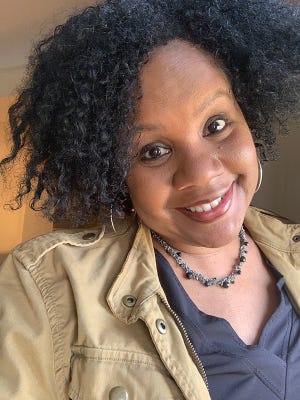 “Marcia Pledger (pictured), a former financial journalist and columnist for the Cleveland Plain Dealer, has been named The Florida Times-Union’s new opinion and engagement editor,” Beth Reese Cravey reported Thursday for the Jacksonville, Fla., newspaper. “She is the first woman and the first Black journalist in the position last served by Mike Clark, who retired in 2020.” Cravey also wrote, “She founded the first . . . chapter for the National Association of Black Journalists in Las Vegas and right out of college joined the national board of directors.” Gannett, which owns the Times-Union, pledged last year that its personnel would mirror the nation’s population of women and BIPOC (Black Indigenous and People of Color) by 2025. Gannett also planned to increase by 30% the share of people who are BIPOC in leadership positions.
“Marcia Pledger (pictured), a former financial journalist and columnist for the Cleveland Plain Dealer, has been named The Florida Times-Union’s new opinion and engagement editor,” Beth Reese Cravey reported Thursday for the Jacksonville, Fla., newspaper. “She is the first woman and the first Black journalist in the position last served by Mike Clark, who retired in 2020.” Cravey also wrote, “She founded the first . . . chapter for the National Association of Black Journalists in Las Vegas and right out of college joined the national board of directors.” Gannett, which owns the Times-Union, pledged last year that its personnel would mirror the nation’s population of women and BIPOC (Black Indigenous and People of Color) by 2025. Gannett also planned to increase by 30% the share of people who are BIPOC in leadership positions.
- “Fox News has been relentlessly negative in its coverage of Black Lives Matter, airing 440 statements attacking the movement from November 2020 through April 2021,” Tyler Monroe and Rob Savillo reported Wednesday for Media Matters for America. “Amid a nationwide call for racial justice, and calls for an end to racial profiling in policing, Fox has repeatedly degraded and attacked the efforts of protesters and organizers, dismissing their concerns and attacking the individuals behind the movements.

Top row, from left: Caelainn Barr, Selase Kove-Seyram, Natalia Viana, Shereen Marisol Meraji, Jakob Moll, Fu Ting, Pranav Dixit. Second row: Dave Mayers, Marisa Palmer, Jonathan Rabb, Choy Yuk-ling (Bao Choy). Third row: Sammy Jo Hester, Jim Urquhart, Gabrielle Schonder, Bill Barrow. Fourth row: Reuben Fischer-Baum, Patricia Laya, Pacinthe Mattar, Julia Lurie, Jorge Caraballo Cordovez, Felice León, Deb Pastner. - “The Nieman Foundation for Journalism at Harvard University, a center internationally recognized for its fellowships, publications and programs, has selected 22 Nieman Fellows from across the globe for a year of on-campus study,” the foundation announced Tuesday. “The journalists will focus their work on some of the most urgent issues facing the industry, ranging from racial justice to disinformation.”
- “Columbia Journalism School announced today 10 Knight-Bagehot Fellows in Economics and Business Journalism for the 2021-2022 academic year,” the school said May 12. “The Fellows represent organizations including Thomson Reuters, Bloomberg News, The Wall Street Journal and the Organized Crime and Corruption Reporting Project (OCCRP). . . .”
- As authorities worry about white supremacist influence in the U.S. military in light of the Jan. 6 Capitol Insurrection, “Fox Nation,” spin-off of Fox News, whose on-air personalities have helped spread the lie that Donald Trump won the 2020 presidential election, is offering one year of free access to all active U.S. military members and veterans. Michael Malone reported Tuesday for nexttv.com, “From May 24 to May 31, military personnel can sign up for the streaming service. Fox Nation calls the promotion Grateful Nation.”
- “In a new open letter to media buyers during the television industry’s upfront period, a broad and diverse coalition of more than 40 organizations is urging media buyers not to buy advertisements on Fox News, warning that any ad spend on the network will fund the promotion of COVID-19 conspiracy theories, bigotry, and lies,” Media Matters for America reported May 18.
- CNN this week debuted “Race Deconstructed,” “a new weekly newsletter that will allow readers to gain insight into current events and American history through conversations on the role that race plays in culture, politics and more.”
- Only the president’s seat will involve a contest in elections this year for board seats of the National Association of Black Journalists, Melanie Eversley, NABJ 2021 elections chair, announced Wednesday. Manuel Smith, managing editor at KYW-TV in Philadelphia and a former president of the Philadelphia Association of Black Journalists, is challenging incumbent Dorothy Tucker, investigative reporter at WBBM-TV in Chicago.
- The Asian American Journalists Association will hold its 40th anniversary virtual convention Aug. 24-28, the group announced Thursday. WarnerMedia is the presenting sponsor.
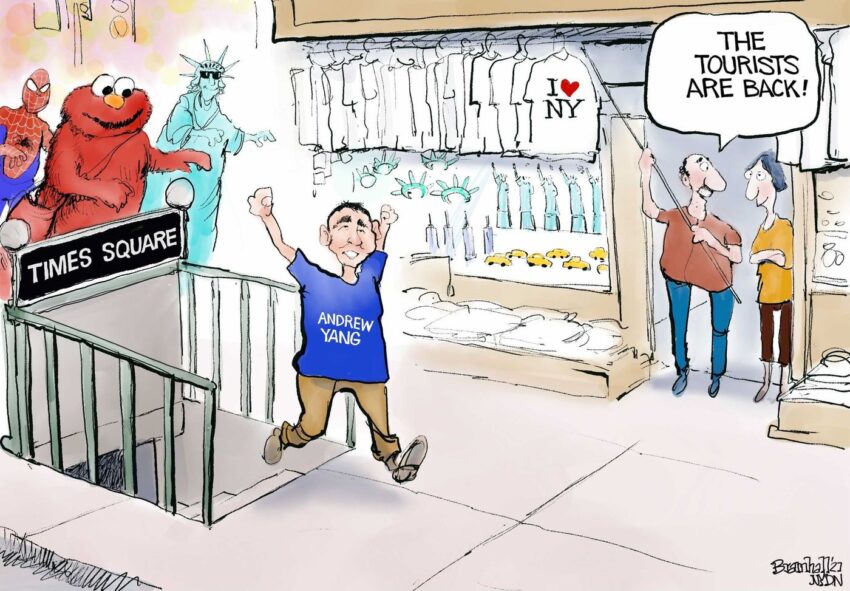
- Josh Greenman, editorial page editor of the Daily News in New York, “defended the paper’s editorial cartoon of Andrew Yang that depicted him as an NYC tourist, which Yang, his wife and others called out as racist,” Kerry Flynn wrote Tuesday in CNN’s “Reliable Sources” newsletter. “Evelyn Yang tweeted Monday it was a ‘racist disfiguration’ and elaborated on her view in a Tuesday press conference, saying, ‘Every time you make a joke about Andrew not being a New Yorker, you are telling Asian Americans that they don’t belong.'” Yang is running for mayor.
 “Meteorologist Chris Bianchi (pictured) will be working at 9NEWS come May 27,” Jake Shapiro reported May 14 for The Denver Post. “The bilingual forecaster will be tasked with giving weather reports in English and Spanish for KUSA over the air and digitally in a hybrid role, including a lot of work on the network’s streaming channels.”
“Meteorologist Chris Bianchi (pictured) will be working at 9NEWS come May 27,” Jake Shapiro reported May 14 for The Denver Post. “The bilingual forecaster will be tasked with giving weather reports in English and Spanish for KUSA over the air and digitally in a hybrid role, including a lot of work on the network’s streaming channels.”
- “Donovan Thomas, a senior at Howard University, will join the Investigations desk as a summer intern,” the New York Times announced May 18. “The internship is in collaboration with the Ida B. Wells Society for Investigative Reporting.”
- Self-parody? A headline at The Root reads, “George Floyd Is Dead Because America Is a Racist Country.”
- “Elizabeth City police arrested two reporters in the USA TODAY Network Wednesday night who were doing their jobs and covering a protest related to the death of Andrew Brown Jr.,” the Fayetteville (N.C.) Observer editorialized May 20. “We must be clear: This police action is a frontal assault on freedom of the press, which is enshrined in the First Amendment. Ayano Nagaishi and Alison Cutler work for The News Leader, based in Staunton, Virginia. The publication belongs to the Southeast Region of the Gannett/USA TODAY Network, which also includes 12 daily newspapers in North Carolina. . . .” The reporters were released about 10:30 p.m. on the day of their arrest.
- “It’s been more than two years since a State Police trooper-involved incident resulted in the death of barber Ronald Greene in Ouachita Parish,” The New Orleans Advocate and NOLA.com editorialized on Tuesday. “Almost immediately, there were questions about what happened.” The editorial also said, “The troopers lied. Cover-ups include specific actions and failure to act on knowledge. Their supervisors, on up to the top, had to know something was wrong. . . . The State Police delay has been a major failure, and it has caused a serious lack of confidence in the agency’s good faith. The delay,” and video footage from Jim Mustian of the Associated Press. “have damaged Louisiana’s standing in the nation. A far-reaching and permanent change in policing is needed, starting with Troop F.”
 “We are excited to announce that Inkoo Kang (pictured) of the Hollywood Reporter will be our new TV critic,” Washington Post editors said Monday. “A veteran culture writer and critic, Inkoo will write reviews, critic’s notebooks and other stories that guide readers with style and clarity through the unending choices on traditional TV and streaming outlets. . . .”
“We are excited to announce that Inkoo Kang (pictured) of the Hollywood Reporter will be our new TV critic,” Washington Post editors said Monday. “A veteran culture writer and critic, Inkoo will write reviews, critic’s notebooks and other stories that guide readers with style and clarity through the unending choices on traditional TV and streaming outlets. . . .”
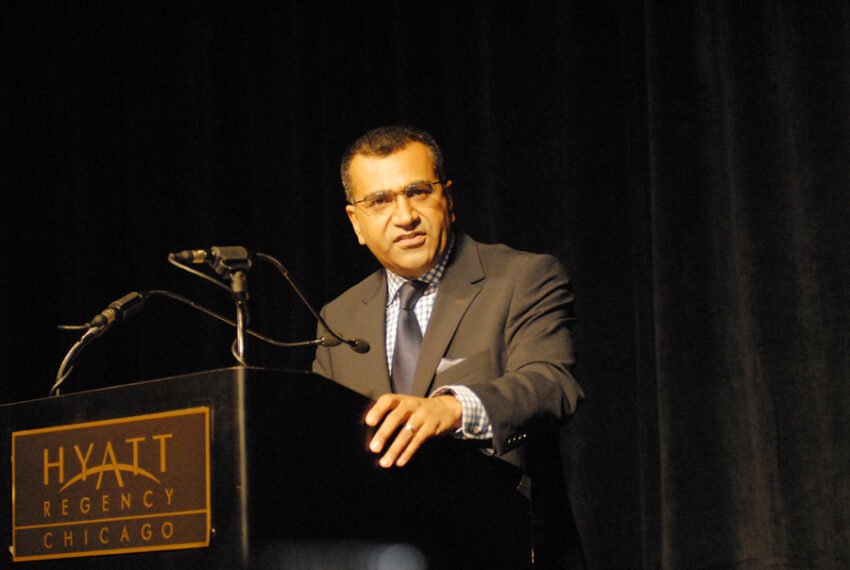
British journalist Martin Bashir at the Asian American Journalists Association convention in 2008. He apologized to the organization afterward, writing, “Upon reflection, it was a tasteless remark that I now bitterly regret.
I am grateful to you for the opportunity to address those present and
hope that the continuing work of the organization will not by harmed or
undermined by my moment of stupidity.” (Credit: Joe Manio/AAJA)- A BBC timeline for the career of Martin Bashir, who was found last week to have engaged in “deceitful behaviour” to secure an interview with Princess Diana in 1995, includes his 2008 appearance before the Asian American Journalists Association. “He apologised in 2008, after saying he was ‘happy to be in the midst of so many Asian babes’ in a speech to US journalists at the Asian American Journalists’ Association annual banquet in Chicago. ‘In fact, I’m happy that the podium covers me from the waist down,’ he added. With his ABC co-presenter Juju Chang standing nearby, Bashir added that a speech should be ‘like a dress on a beautiful woman — long enough to cover the important parts and short enough to keep your interest — like my colleague Juju’s’. “
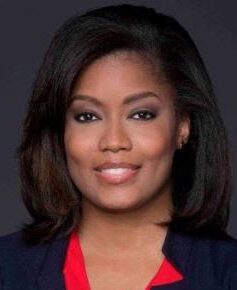 “MSNBC, home of Joy Reid, the only Black female host in prime-time news, is the most popular cable news network with Black viewers this quarter, accounting for 26 percent of the network’s total viewership throughout the day and 22 percent of the weekday prime-time audience,” Jeremy Barr wrote Monday for The Washington Post. “The network also attracts Asian and Pacific Islander viewers at a higher clip than the competition, representing 4 percent of the prime-time total viewership during the same time period.” Barr was writing about Rashida Jones (pictured), the new president of MSNBC, who “has been thinking about how to mint more MSNBC fans of all ages by publishing content across a multitude of platforms and formats, not just the traditional television channel.”
“MSNBC, home of Joy Reid, the only Black female host in prime-time news, is the most popular cable news network with Black viewers this quarter, accounting for 26 percent of the network’s total viewership throughout the day and 22 percent of the weekday prime-time audience,” Jeremy Barr wrote Monday for The Washington Post. “The network also attracts Asian and Pacific Islander viewers at a higher clip than the competition, representing 4 percent of the prime-time total viewership during the same time period.” Barr was writing about Rashida Jones (pictured), the new president of MSNBC, who “has been thinking about how to mint more MSNBC fans of all ages by publishing content across a multitude of platforms and formats, not just the traditional television channel.”
- After spending six years with ESPN as an anchor, Michael Eaves has signed a multi-year contract to remain with the company, Dominique Yates reported for Louisville Courier Journal.
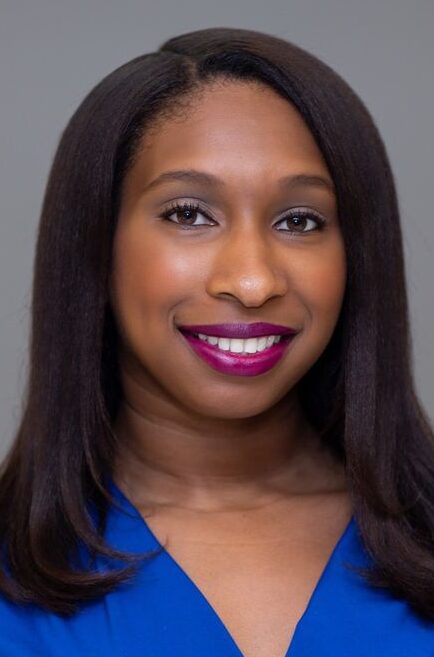 “Aisha Al-Muslim (pictured) is joining the Managing Editor’s Office on May 27 to oversee our storied internship program,” Sarah Rabil, The Wall Street Journal’s assistant managing editor for talent, announced May 20. Rabil also wrote, “Aisha will be moving over from her position as a reporter on the WSJ Pro Bankruptcy team, and she previously was a spot news reporter on our Real-Time News Desk, as well as our resident Backstreet Boys superfan. . . .”
“Aisha Al-Muslim (pictured) is joining the Managing Editor’s Office on May 27 to oversee our storied internship program,” Sarah Rabil, The Wall Street Journal’s assistant managing editor for talent, announced May 20. Rabil also wrote, “Aisha will be moving over from her position as a reporter on the WSJ Pro Bankruptcy team, and she previously was a spot news reporter on our Real-Time News Desk, as well as our resident Backstreet Boys superfan. . . .”
 “FOX61 and CW20 announced today that Richard Washington III (pictured) has been named news director of the FOX and CW network-affiliated stations in the Hartford and New Haven market, effective June 14,” the Connecticut media outlets announced May 19. They also said, “Washington comes to FOX61/CW20 from TEGNA-owned WCNC, where he has served as assistant news director at the NBC affiliate in Charlotte, North Carolina since December 2019.”
“FOX61 and CW20 announced today that Richard Washington III (pictured) has been named news director of the FOX and CW network-affiliated stations in the Hartford and New Haven market, effective June 14,” the Connecticut media outlets announced May 19. They also said, “Washington comes to FOX61/CW20 from TEGNA-owned WCNC, where he has served as assistant news director at the NBC affiliate in Charlotte, North Carolina since December 2019.”
 FOX News Channel has named Rachel Campos-Duffy (pictured), network contributor and FOX Nation host, as co-host of “FOX & Friends Weekend,” Fox News announced Monday. She will be the only Hispanic woman to co-host a cable news morning program, it said.
FOX News Channel has named Rachel Campos-Duffy (pictured), network contributor and FOX Nation host, as co-host of “FOX & Friends Weekend,” Fox News announced Monday. She will be the only Hispanic woman to co-host a cable news morning program, it said. 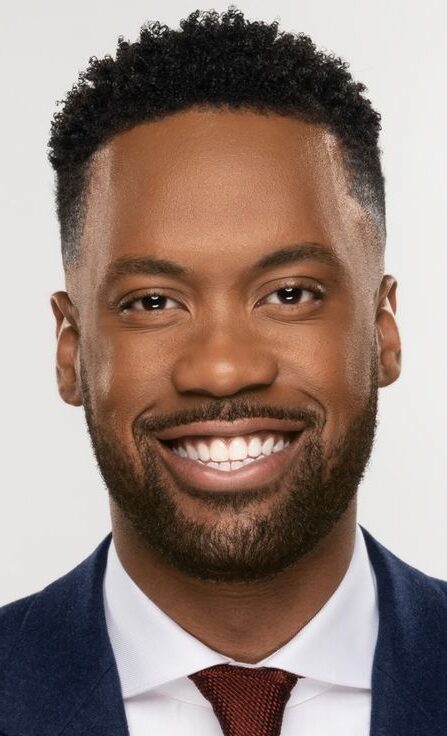 Additionally, Lawrence Jones (pictured) will take on a new position as enterprise reporter for the “FOX & Friends” franchise, and will continue to fill in as co-host of both the weekday and weekend editions of the show.
Additionally, Lawrence Jones (pictured) will take on a new position as enterprise reporter for the “FOX & Friends” franchise, and will continue to fill in as co-host of both the weekday and weekend editions of the show.
- “
 New York Times Zimbabwean correspondent Jeffrey Moyo (pictured) was arrested Wednesday amid claims he was caught assisting some foreign journalists who were not accredited with the Zimbabwe Media Commission,” New Zimbabwe reported Thursday. “Moyo was set to appear before a Harare magistrate this Thursday.”
New York Times Zimbabwean correspondent Jeffrey Moyo (pictured) was arrested Wednesday amid claims he was caught assisting some foreign journalists who were not accredited with the Zimbabwe Media Commission,” New Zimbabwe reported Thursday. “Moyo was set to appear before a Harare magistrate this Thursday.”
- “Journalist Paul Chouta has been sentenced to 23 months’ imprisonment and ordered to pay several million CFA francs in fines and damages after being held for two years awaiting a trial verdict in Cameroon,” Reporters Without Borders said May 19. The group “deplores this excessive and unjustified penalty which is a serious attack on press freedom. The judge’s verdict was finally issued yesterday after being postponed 27 times. Paul Chouta, a reporter for the Cameroun Web media outlet and a whistleblower critical of the government, was the subject of a complaint brought by the novelist Calixthe Belaya alleging defamation and the publication of fake news.”
- “The Solutions Journalism Africa initiative, supported by the Solutions Journalism Network, is aiming to expand the practice of Solutions Journalism in Africa. In Nigeria, the initiative will be implemented by Nigeria Health Watch,” the health-watch group announced May 20. “Solutions Journalism adopts a solutions-oriented approach to journalism; telling rigorous, investigative, and compelling stories of responses to existing social problems so that they can be scaled up or replicated elsewhere. . . .”
- To get the real story behind India’s COVID crisis, “many media outlets have increasingly been doing some traditional shoe-leather journalism,” Diksha Madhok reported Monday for CNN. “This reporting has surprised many readers: India’s vast media have become increasingly subservient” to Prime Minister Narendra Modi’s government “since the Hindu nationalist was first elected Prime Minister seven years ago. The ruling party has used a range of tactics, ranging from forcing advertisers to cut off outlets that are critical of its policies to shutting down channels, to ensure the press is reshaped into its cheerleader. . . .”
- “In the last three days, journalist [Mary Karla Ares from ICLEP] has been subjected to intense interrogation every five and ten minutes throughout the night with every intention of torturing her, preventing her from sleeping,” the Cuban Institute for Freedom of Expression and Press (ICLEP) reported Monday. “‘Mary Karla is being subjected to psychological torture, they told me that they take her out every five minutes, every ten minutes at night, at dawn, that they are not letting her sleep,’ the journalist’s father, Carlos Alberto Ares, told ICLEP.”
- “A journalist in Myanmar who’s a native of metro Detroit has been detained by authorities in Myanmar, according to his colleagues and a brother in Michigan,” Niraj Warikoo reported Monday, updated Tuesday, for the Detroit Free Press. “Danny Fenster, 37, managing editor of Frontier Myanmar, has worked in Myanmar for about two years, his brother, Bryan Fenster, told the Free Press on Monday. In February, the military in Myanmar seized power in a coup. . . .”
 Reporters Without Borders has called on Ethiopian authorities to reinstate the press accreditation of Simon Marks (pictured), an Addis Ababa-based reporter for The New York Times and Bloomberg News, and to allow journalists to work freely. The group said May 18, “After several semi-official warnings in preceding months, Simon Marks was notified on his return from reporting in the war-torn northern Tigray region in March that the Ethiopian Broadcasting Authority (EBA) had suspended his accreditation for ‘lacking impartiality’ and for disseminating ‘fake news.’ ” Times international editor Michael Slackman said in the Times, “It is deeply disappointing that a Nobel Peace Prize recipient would try to silence an independent press. We encourage the government to rethink this authoritarian approach and instead work to foster a robust exchange of information. It can start by reissuing Mr. Marks’s credentials and freeing any journalist being detained.”
Reporters Without Borders has called on Ethiopian authorities to reinstate the press accreditation of Simon Marks (pictured), an Addis Ababa-based reporter for The New York Times and Bloomberg News, and to allow journalists to work freely. The group said May 18, “After several semi-official warnings in preceding months, Simon Marks was notified on his return from reporting in the war-torn northern Tigray region in March that the Ethiopian Broadcasting Authority (EBA) had suspended his accreditation for ‘lacking impartiality’ and for disseminating ‘fake news.’ ” Times international editor Michael Slackman said in the Times, “It is deeply disappointing that a Nobel Peace Prize recipient would try to silence an independent press. We encourage the government to rethink this authoritarian approach and instead work to foster a robust exchange of information. It can start by reissuing Mr. Marks’s credentials and freeing any journalist being detained.”
 “With an appalling economic environment, the media is left alone to survive, which is one of the key reasons why professional journalism is being relegated, giving way to mediocrity and patronage.” Othello B. Garblah (pictured), president of the Publishers Association of Liberia, said at a one-day media roundtable discussion organized by the Press Union of Liberia and the Carter Center Liberia. “According to him, with a devastating economy such as the one we have in Liberia coupled with poor readership and dwindling circulations, the media is unable to recruit, retain and pay professional staff,” Mark N. Mengonfia reported May 20 for New Republic Liberia.
“With an appalling economic environment, the media is left alone to survive, which is one of the key reasons why professional journalism is being relegated, giving way to mediocrity and patronage.” Othello B. Garblah (pictured), president of the Publishers Association of Liberia, said at a one-day media roundtable discussion organized by the Press Union of Liberia and the Carter Center Liberia. “According to him, with a devastating economy such as the one we have in Liberia coupled with poor readership and dwindling circulations, the media is unable to recruit, retain and pay professional staff,” Mark N. Mengonfia reported May 20 for New Republic Liberia.
To subscribe at no cost, please send an email to journal-isms+subscribe@groups.io and say who you are.
Facebook users: “Like” “Richard Prince’s Journal-isms” on Facebook.
Follow Richard Prince on Twitter @princeeditor
Richard Prince’s Journal-isms originates from Washington. It began in print before most of us knew what the internet was, and it would like to be referred to as a “column.” Any views expressed in the column are those of the person or organization quoted and not those of any other entity. Send tips, comments and concerns to Richard Prince at journal-isms+owner@
groups.io View previous columns (after Feb. 13, 2016).
View previous columns (before Feb. 13, 2016)
- Diversity’s Greatest Hits, 2018 (Jan. 4, 2019)
- Book Notes: Is Taking a Knee Really All That? (Dec. 20, 2018)
- Book Notes: Challenging ’45’ and Proudly Telling the Story (Dec. 18, 2018)
- Book Notes: Get Down With the Legends! (Dec. 11, 2018)
- Journalist Richard Prince w/Joe Madison (Sirius XM, April 18, 2018) (podcast)
- Richard Prince (journalist) (Wikipedia entry)
- February 2018 Podcast: Richard “Dick” Prince on the need for newsroom diversity (Gabriel Greschler, Student Press Law Center, Feb. 26, 2018)
- Diversity’s Greatest Hits, 2017 — Where Will They Take Us in the Year Ahead?
- Book Notes: Best Sellers, Uncovered Treasures, Overlooked History (Dec. 19, 2017)
- An advocate for diversity in the media is still pressing for representation, (Courtland Milloy, Washington Post, Nov. 28, 2017)
- Morgan Global Journalism Review: Journal-isms Journeys On (Aug. 31, 2017)
- Diversity’s Greatest Hits, 2016
- Book Notes: 16 Writers Dish About ‘Chelle,’ the First Lady
- Book Notes: From Coretta to Barack, and in Search of the Godfather
- Journal-isms’ Richard Prince Wants Your Ideas (FishbowlDC, Feb. 26, 2016)
- “JOURNAL-ISMS” IS LATEST TO BEAR BRUNT OF INDUSTRY’S ECONOMIC WOES (Feb. 19, 2016)
- Richard Prince with Charlayne Hunter-Gault,“PBS NewsHour,” “What stagnant diversity means for America’s newsrooms” (Dec. 15, 2015)
- Book Notes: Journalists Follow Their Passions
- Book Notes: Journalists Who Rocked Their World
- Book Notes: Hands Up! Read This!
- Book Notes: New Cosby Bio Looks Like a Best-Seller
- Journo-diversity advocate turns attention to Ezra Klein project (Erik Wemple, Washington Post, March 5, 2014)

